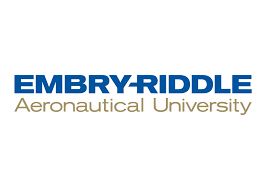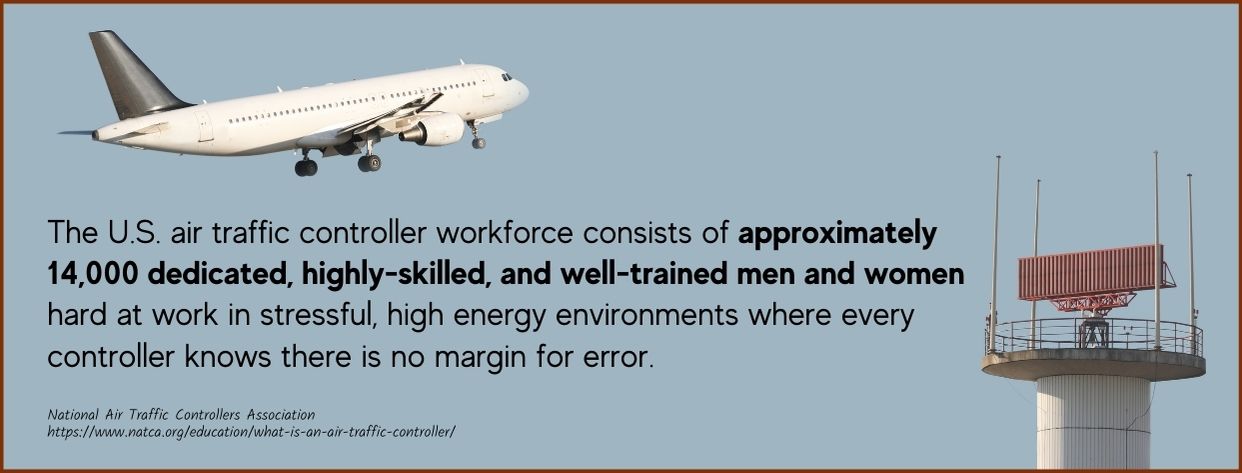Find Your Perfect School
An Air Traffic Controller keeps our skies safe! Sounds simple, right? But in reality, becoming an Air Traffic Controller is a HUGE responsibility that requires the proper training.
The Federal Aviation Administration, or FAA, reports many fascinating numbers to consider. Take a look:
- There are 16,405,000 flights in operation by the FAA annually,
- That’s 45,000 flights per day.
- On average, there are 5,400 pieces of aircraft in the sky at peak operational times,
- Covering 24,100,000 miles of oceanic airspace.
- There are 19,633 U.S. Airports, generating over 10,857,000 jobs in the field of Aviation.
- It’s a 488 billion-dollar-per-year industry!
So, learn how to get your share of the profits by becoming an Air Traffic Controller! There are several ways to obtain your dream of becoming an Air Traffic Controller. Here, we will answer your questions… so you can get started today.
Related Article: The Highest Paying Jobs With A Trade School Education
10 BEST SCHOOLS FOR AN AIR TRAFFIC CONTROLLER DEGREE
Arizona State University
(On-campus) BS in Aeronautical Management Technology – Air Traffic Management
Offered at ASU’s The Polytechnic School, the BS in Aeronautical Management Technology leads to a career in air traffic control and other aviation occupations. Students develop technical skills specific to the industry, from aircraft operations and air traffic control to management and business skills. The program requires students to take specific courses for eligibility toward an airline dispatcher certificate, too.
This is an AABI-accredited program that also possesses certification for its ground and flight instruction from the FAA. The intensive nature of the instruction demands full-time commitment, too. Students learn in two formats: rigorous coursework and laboratory practice in ASU’s advanced air traffic control simulators. TRACON facilities are also training venues. Both components are regularly updated to keep up with the latest air traffic control systems technologies.
Students must practice their analytical thinking, problem-solving, and communication skills during their academics and laboratory work. These skills are vital in real-world scenarios, thus, the emphasis.
Graduates may take professional licensure exams in Arizona with the degree as part of their academic credentials.
ASU also offers an accelerated 4+1 program that allows students to earn both a bachelor’s and a master’s degree in aeronautical management technology in five years.
Programs Offered:
- Graphic Information Technology
- Human Systems Engineering
There’s no doubt about it – ASU’s degree in air traffic management is among the best in the country! You should check it out and start on your career.
Embry-Riddle Aeronautical University
(On-campus) BS in Air Traffic Management
ERAU holds the unique distinction of being among the original 13 colleges and universities with the FAA-granted Collegiate Training Initiative credential. Alumni and students report that knowledgeable professors are passionate about sharing their expert knowledge about air traffic control.
Many of the courses are conducted at the College of Aviation building, where several simulation equipment types are installed and ready for use by students. These include radar controller workstations, supervisor stations, airport model tabletops, and Elo touchscreen monitors. There is also a 360-degree interactive tower cab and a Lockheed Martin flight simulator for immersive experiences.
Freshman courses focus on aviation-focused general education courses, including computer science, meteorology, and math. Transferable skills are also developed during the first year of studies since these will be useful in succeeding semesters. Technical skills are acquired during the higher years when upper-level lab courses are conducted in an ATC Laboratory. This laboratory features a technology replica, including the hardware and software used in real ATC facilities.
Students receive such intensive classroom and hands-on training that they can enter the competitive FAA Academy! The range of technical skills includes simultaneous operations of multiple radar and tower controllers and proficiency in the use of other ATC equipment. Students also engage in internships and co-ops with aviation companies, including airlines.
Programs Offered:
- Business Administration
- Engineering
With more than 14,000 new positions opening up in the next decade, you should take the first steps toward a career in air traffic management! Enroll now in ERAU’s BS in Air Traffic Management program!
Purdue University
(On-campus) BS in Aviation Management
Hosted by the School of Aviation and Transportation Technology, Purdue’s BS in Aviation Management degree prepares students for successful careers in the aviation industry. Students take on academic coursework, hands-on training, and research projects that equip them with technical skills in aviation management. Many of the research projects touch on industry-level topics like alternative fuels and emerging aviation challenges.
Students can also take courses for eligibility to the American Association of Airport Executives’ Certified Member Examination. The program also comes with a 4+1 option wherein students earn bachelor’s and master’s degrees in aviation management in five years. This is an intensive program of study that demands full-time commitment for satisfactory progress.
Aside from the general education courses in math, science, and English, students must also take major courses for trade-specific skill sets. The coursework starts with an introduction to aviation technology, the process to Aerospace Vehicle Propulsion And Tracking Systems, Aviation Operations Management, and Aviation Law.
Hands-on experiences are gained through laboratory sessions in the Aviation Electronics Lab, Aviation Materials Lab, and Engine Test Cells. Students spend roughly 20 hours per week at the Aviation Electronics Lab for their 200-level and up courses. Training is also conducted at the Holleman-Niswonger Simulator Center and Operations Control Center. Research projects are conducted at the Hangar of the Future.
Programs Offered:
- Construction Management
- UX Design
Purdue is among the best universities to earn your BS in Aviation Management degree because of its outstanding quality of instruction! Become more competitive and land your dream job sooner.
University of North Dakota
(On-campus) BS in Aeronautics Major in Air Traffic Management
UND’s BS in Aeronautics Major in Air Traffic Management program aims to produce the next generation of the best air controllers in the country. This is an achievable goal considering its excellent academic reputation backed by expert faculty, relevant curriculum, and exceptional quality of instruction! The selective admission process means that said reputation is maintained.
The 4-year program consists of 120 credit hours with general education, major and elective courses. Advanced Tower Operations, Aviation Safety, and Radar Operations are among the technical courses. There are also courses related to the human side of air traffic management, such as Aviation Law and Human Factors. The transferable skills are learned through courses in English composition and public speaking.
Students must complete a senior aviation capstone where effective collaboration with a multidisciplinary team is vital for success. The capstone project explores issues and their solutions related to aviation safety, technology advances, and other aviation-related topics.
The AABI-accredited program equips its graduates with the skill sets for air traffic controller jobs and certain perks. Graduates can apply for coveted Air Traffic Control Specialist jobs at the FAA; a letter of recommendation from the Department of Aviation may be required. Graduates are also exempted from the BQ component of the hiring process.
Programs Offered:
- Biomedical Engineering
- Physics
The BS in Aeronautics major in Air Traffic Management degree from UND can be your ticket toward a well-paying job at the FAA! Start on it now and become more competitive.
Lewis University
(On-campus) BS in Air Traffic Control Management
Lewis’ BS in Air Traffic Control Management program is excellent preparation for the FAA Academy, where the best air traffic controllers have trained. Students undergo rigorous academic training combined with hands-on learning and laboratory simulations starting in their first year.
Admission is selective, with candidates considered only when their high school GPA is 3.0 at least, and their standardized test scores are 21 (ACT) or 1000 (SAT). For transfer students with a bachelor’s degree, the minimum GPA is 3.0 on a 4.0 scale. Even candidates who meet minimum requirements aren’t guaranteed admission.
This is a 128-credit course with 78 credits in the major course. The coursework includes Aviation Regulations, Aviation Meteorology, Visual Aircraft Recognition, and Transportation Safety Management Systems. Private and commercial ground school courses are also on the curriculum: Practical Dispatching, Tower Ground Control, and Advanced Radar Fundamentals.
Students also gain management skills through courses in supervisory management and human resource management. These courses are also designed for transferable skills development.
Retention requirements include an overall minimum 3.0 GPA in major ATC courses and a minimum “C” grade in all other major courses. An aptitude test is also conducted for all students midway through the program, and after all, courses have been completed.
Programs Offered:
- Computer Engineering
- Biomedical Science
Check out the BS in Air Traffic Control Management degree program at Lewis if you want to become an FAA air controller!
Lynn University
(On-campus) BS in Air Traffic Control
Offered at the Burton D. Morgan College of Aeronautics, Lynn’s BS in Air Traffic Control degree attracts the best students passionate for an aviation career. Students learn technical skills in the university’s state-of-the-art training facility and extensive academic courses relevant to air traffic control certifications. Many students also become professional pilots and, thus, know on-the-ground and up-in-the-air operations.
The faculty members with their flight instructor ratings and advanced academic degrees are best positioned to share their knowledge with students. But they go beyond sharing since they are also invested in their student’s academic success! More individualized attention is possible with small class sizes.
Students also train in the university’s simulators and its Cessna 172 aircraft. These hands-on training sessions strengthen their theoretical knowledge of air traffic basics. Aviation safety, control systems, and airport operations are also on the curriculum.
With such extensive training, graduates are qualified for the ATP at 1,000 hours. Students planning to get flight training beyond the certificate for private pilots must do so at Lynn University only.
Note that Lynn University is a private institution, so commensurate fees apply. Students can avail themselves of many scholarship opportunities, including the full-tuition Scholastic Achievement Foundation of Palm Beach County grant.
Programs Offered:
- Biology
- Digital Media
Earning your BS in Air Traffic Control degree at Lynn takes you one step closer to your dream FAA job! Click on the link and start your journey today.
Florida State College at Jacksonville
(On-campus) AS in Aviation Administration
Oh, the career paths that you can take with the AS in Aviation Administration degree from FSCJ! Graduates can pursue several aviation-related careers, from air traffic controllers to aviation management with higher education. Among the popular places of employment are airlines, airport operators, air cargo operations, and the FAA.
Students can choose a concentration, sort of, by enrolling in specific electives. There are three options:
- Aircraft Dispatch with the courses that may be transferred as credits to an FAA-approved program.
- Air Traffic Control track where students learn about air traffic regulations and operations. Academic lessons are complemented by hands-on experience in en route and tower simulators.
- Unmanned Aerial Systems (UAS) track designed for drone technology-related operations and control. Students may earn the FAA Drone Pilot Certification through this track.
The 36-credit professional coursework covers aviation regulations, air traffic control, aviation and airport security, and aviation weather. General education courses include statistics, differential equations, and English communication, vital to air traffic controller work. To be retained in this program, students must earn at least a “C” grade in the professional courses.
Hands-on training is at the Cecil Center, where FSCJ’s Aircraft Services Educational Facility is located. Students also enjoy the immersive experience of being in an active airport.
Programs Offered:
- Construction Management
- Public Safety
With an AS in Aviation Administration degree, you won’t have to worry about getting a well-paying air traffic controller job! Check it out at FSCJ now and see what we mean.
Atlantic Cape Community College
(On-campus) AAS in Air Traffic Control Terminal
With ACCC’s AAS in Air Traffic Control Terminal degree, entry-level air traffic controller jobs will be within reach. Students learn the basic principles and practices in air traffic control through a combination of academics and hands-on training. Every successful air traffic controller has excellent transferable skills, so students also gain communication and collaboration skills.
The learning outcomes include proficiency in interpreting and explaining ATC rules and regulations, finding solutions for ATC-related issues, and demonstrating aircraft control in simulations. Emphasis must be made that ACCC is still on pending status with its AT-CTI application. In the meantime, the college has articulation agreements with AT-CTI colleges so graduates can transfer their earned credits to their institutions.
The program of study consists of 20 credits of general education with courses in public speaking, composition, math, and science. The professional courses, a 40-credit series, consists of aviation weather, air traffic control regulations, terminal radar, and control tower operations. Students must complete all 60 credits to earn the associate degree aside from maintaining satisfactory academic standing throughout the program.
Programs Offered:
- Business Administration
- Studio Arts
Let the AAS in Air Traffic Control Terminal degree become your first stepping stone toward a successful aviation career!
Aims Community College
(On-campus) AAS in Air Traffic Control
Aim’s AAS in Air Traffic Control program has 65 credits that students can transfer into higher education degrees and professional certifications. While this is an introductory program, it’s designed for aspiring air traffic controllers who want a competitive headstart in the race for FAA jobs.
The coursework is as challenging as in any bachelor’s degree program with major courses related to air traffic control. These include phraseology, procedures, and laws and aviation meteorology, and radar and non-radar simulation. The simulation courses also cover en route and TRACON. Students must complete the Instrument Pilot Ground School course, too.
The hands-on experiences are immersive sessions where students must focus on the task at hand, just as it is in real-world air traffic control towers. Proficiency in the language, protocols, and procedures must also be developed with each succeeding course. Three semesters are devoted to the immersive laboratory environment.
Graduates are considered eligible for the FAA Academy provided that the federal agency’s requirements are met. Students must be prepared to undergo extensive background checks, medical examinations, and English proficiency tests.
Programs Offered:
- Agricultural Business
- Animal Science
Aim high with an AAS in Air Traffic Control degree from ACC! It’s a sure step toward getting the air traffic controller job you’ve been aspiring for.
Community College of Baltimore County
(On-campus) AAS in Air Traffic Control
The beauty of the AAS in Air Traffic Control degree from CCBC is that it’s useful not only for air traffic control but also for other aviation-related careers. Many students used it to become Flight Service Station Specialists, although air traffic control is its best fit. This is an FAA-approved program under ATC-CTI, and, thus, it’s specifically designed for training in TRACON facilities, airport control towers, and ARTCC.
This is a 65-credit program with full-time study recommended to complete within two years. The two-year completion rate assumes that there are no transfer credits and prior development coursework done by the candidate for admission. Transfer credits usually apply to earned college credits, such as through Advanced Placement courses or another associate degree.
The program of study has a sequential structure, so students build on their knowledge and skills as they progress in the program. The first semester covers basic aviation-related topics like VFR flight operations, private pilot ground school, and aviation history. The second semester introduces more advanced topics on air traffic control and its operations and meteorology.
The technical and transferable skills learned here take students a step closer to the FAA Academy, too.
Programs Offered:
- Automotive Technology
- Business Management
Quality instruction and affordable costs are what make the AAS in Air Traffic Control degree from CCBC attractive! Check it out and perhaps enroll in it.
FREQUENTLY ASKED QUESTIONS
What does an Air Traffic Controller do?
The main objective of the Air Traffic Controller is to maintain a safe distance between aircraft in the air and on the ground as they watch airplanes taxiing the runway for landing or take off. They also must keep a watchful eye on weather conditions that may affect flights, as well as other important information about runway closures or emergencies.
What are the various paths to becoming an Air Traffic Controller?
Perhaps the best way to become an Air Traffic Controller is to enroll in a trade-type school that specializes in the field, such as that offered through the Federal Aviation Administration. They offer the Air Traffic Collegiate Training Initiative, or AT-CTI, program.
In addition, there is another route that includes:
- Earning a Bachelor’s degree in an aviation-related field,
- Have at least three years of work experience.
You can choose an option that best fits your goal and geographical location. The AT-CTI program is offered in several areas around the U.S.
How long will it take to become an Air Traffic Controller?
The answer to this question can vary greatly. Depending on your program, you will generally need an Associate or Bachelor’s degree from an AT-CTI program, which can be completed between two and four years. Long-term on-the-job training is also required; although, earning a bachelor’s degree in aviation may allow you to meet the “experience” requirement more quickly.
In some instances, FAA Academy training may only take two to five months to complete; however, extensive on-the-job training is a must, perhaps three years or more.
To summarize, your route to becoming an Air Traffic Controller may be different from someone else’s; therefore, you can expect anywhere from five years or more to become fully certified, in most cases.
What is the cut-off age for becoming an ATCO?
You must apply for Air Traffic Controller training before you turn 31 years old. Now, there is one exception to that. If you have former military training in the field, you can apply after the age of 31.
And, if you are interested in an early retirement… This is the job for you because you will be required to retire by the age of 56.
What qualifications do I need to become a Controller?
To be an ATCO, you must adhere to these qualifications:
- Be a U.S. citizen,
- Pass all medical requirements, such as drug screening and a physical,
- Pass a background check,
- Begin your training by age 31,
- Complete your training, with your required work experience,
- Pass the Air Traffic Controller certification examination,
- Pass the FAA pre-employment test, including a biodata test.
What kind of salary can I expect as an Air Traffic Controller?
As of May 2020, the BLS reported the estimated average salary of an Air Traffic Controller is $132,250 annually, with the highest 10% earning upwards of $189,800 per year with experience.
What is the job outlook for becoming an ATCO?
Actually, the job outlook is a little slower than average at an expected 1% growth rate between 2022 and 2032. Although the growth does predict an increase, it will be limited.
How many hours per week do Air Traffic Controllers work?
Working as an ATCO is a full-time job; however, the FAA regulates your air hours. Typically, you can work no more than 10 hours at a time and must have nine hours of rest between each shift. But, you should be prepared to work all hours of the day or night, as well as weekends and holidays.
What types of ATCO should I consider?
There are three types of work to consider in this field, such as:
- Tower Controller – Instructs the movements of vehicles on the taxiways and runways and gives clearance for landing and take off. They manage traffic in a three to thirty-mile radius from the airport.
- Approach & Departure Controllers – Ensures that aircraft are safe between twenty to fifty miles from the airport and up to 17,000 feet up in the air. Watching weather conditions, they keep a safe distance between aircraft and maintain flight paths.
- En Route Controllers – Guides aircraft after leaving an airport’s airspace, ensuring safety and efficiency.
What kind of certification do I need to be a Controller?
Air Traffic Controllers must be appropriately certified by the FFA. You will need to pass an examination and meet the minimum experience requirements to gain your certification.
Is the job of an Air Traffic Controller stressful?
As you can imagine, the Air Traffic Controller’s job is a huge responsibility as many people’s lives will depend on your knowledge, skills, and capabilities. It will require maximum concentration without distractions; however, you will be prepared to handle emergencies accordingly, knowing you have done your job well and confidently with proper training.
Are there benefits to becoming an Air Traffic Controller?
Yes, there are many benefits to becoming an Air Traffic Controller. They include:
- job security and stability,
- competitive salary and benefits,
- potential for advancement and career growth,
- the opportunity to travel,
- and the satisfaction of helping to ensure the safety of air travelers.











